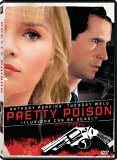| Reviews & Columns |
|
Reviews DVD TV on DVD Blu-ray 4K UHD International DVDs In Theaters Reviews by Studio Video Games Features Collector Series DVDs Easter Egg Database Interviews DVD Talk Radio Feature Articles Columns Anime Talk DVD Savant Horror DVDs The M.O.D. Squad Art House HD Talk Silent DVD
|
DVD Talk Forum |
|
|
| Resources |
|
DVD Price Search Customer Service #'s RCE Info Links |
|
Columns
|
|
|
Pretty Poison
Dennis to Sue Ann, surprised: "You're cool."
A difficult film to properly assess today, Pretty Poison (1968) was not a hit when it was new but gradually developed a cult following from audiences who admired its unusualness and especially the co-leading performance of Tuesday Weld, a talented actress who only rarely has had the opportunities she deserves. Since its release so many movies have copied its basic premise, characterizations, and various story elements that what was quite shocking back then now seems overly familiar and predictable, though the performances and the telling of its story still hold up very well. It's also a movie best experienced knowing nothing about it going in, so if you're thinking about watching it read no further, as Spoilers Abound.
Dennis Pitt (Anthony Perkins, also excellent), who at 15 set fire to his aunt's house and burned her alive, years later is released from a mental institution. His parole officer, Morton Azenauer (John Randolph) finds him a job at a chemical plant in a small Massachusetts town, but it's clear from the get-go that Pitt isn't quite playing with a full deck. When he picks up a pretty high school senior, drum majorette and honor student Sue Ann Stepanek (Tuesday Weld), he gradually convinces her (or does he?) that he's a federal agent investigating the dumping of toxic waste at the plant.
They commence an affair with he piling lie upon lie, and she turned on by his apparently glamorous life as a federal agent. He drafts her into joining him a "mission" to sabotage the plant, but things go horribly wrong when he's spotted by a night watchman - and she kills him in cold blood.
And it doesn't stop there. As they get in deeper and deeper, he begins to go to pieces while she actually seems to thrive, finding her calling as a natural born killer.
For 1968 audiences, part of the film's surprise is that it completely flip-flops audience expectations. They were still avoiding those late-night, home alone showers in the wake of Psycho, so Anthony Perkins in another fresh-out-of-the-nuthouse role strongly suggested another Norman Bates-like character. Conversely, Weld was best-known at the time as high schooler Thalia Menninger, the would-be idealized girlfriend of Dwayne Hickman on The Many Loves of Dobie Gillis. She was only on the show for one season, but it was hard for audiences to accept her in anything else. That his character would elicit such relative sympathy while she would emerge as an utterly unrepentant killer who eventually, gleefully commits matricide, shooting her understandably surprised if unsympathetic mother (Beverly Garland, in a nice change-of-pace), really threw audiences off-balance.
Such cases of "pretty poison" were common in '40s film noir but comparatively new in such a seemingly wholesome small town girl and in the film's naturalistic setting. Indeed, its Small Town, U.S.A. atmosphere - the film was shot on location in Massachusetts - is a big part of its success, and director Noel Black and screenwriter Lorenzo Semple, Jr., adapting Stephen Geller's novel She Let Him Continue, create an atmosphere that strongly anticipates the later films (and television series) of David Lynch.
Like Lynch, the underbelly of small town life is quite disturbing but understated. In Pretty Poison, gawkers silently take in the site of the first murder, much as they watched transfixed Roger Corman's St. Valentine's Day Massacre at the local bijou. And, despite Pitt's unbalanced mental state, he's probably right in his accusation that Dick O'Neill's chemical company is negligently exposing his fellow townspeople to untold toxic chemicals (and responsible for Sue Ann's aberrant behavior?).
The recurring use of pollution, of people looking through lenses (binoculars, through windows, etc., with Pitt's job at the plant involving staring through an enormous, distorting magnifying lens) and so forth are definitely there but the mostly restrained film also seems to invite multiple interpretations. For instance, at what point does Sue Ann realize that her boyfriend has been lying to her all along: when he finally confesses to her, or did she have him figured out all along?
Video & Audio
Pretty Poison is presented in an okay if rather soft 16:9 enhanced transfer at 1.77:1 that approximates its original 1.85:1 release. The colors, contrast, and sharpness of the image are all okay if unexceptional. Supplementing the original mono track is Fox's usual faux stereo one, along with a mono Spanish track and subtitles in both languages. There are no Extra Features, a real crime given this picture's cult following. A commentary track with Black, Weld (who apparently didn't get along), and Geller would seem a real natural.
Parting Thoughts
Though dated through subsequent imitation, Pretty Poison still holds up in many other ways: its subtle handling of its delicate, engrossingly eccentric story, Perkins and especially Tuesday Weld as a heavenly creature that could turn on a dime from small town sweetheart to cold-blooded killer.
Film historian Stuart Galbraith IV's most recent essays appear in Criterion's new three-disc Seven Samurai DVD and BCI Eclipse's The Quiet Duel.
|
| Popular Reviews |
| Sponsored Links |
|
|
| Sponsored Links |
|
|
| Release List | Reviews | Shop | Newsletter | Forum | DVD Giveaways | Blu-Ray | Advertise |
|
Copyright 2024 DVDTalk.com All Rights Reserved. Legal Info, Privacy Policy, Terms of Use,
Manage Preferences,
Your Privacy Choices | |||||||














